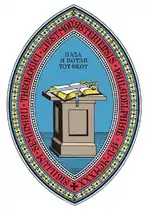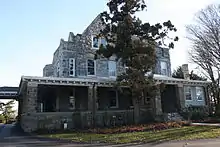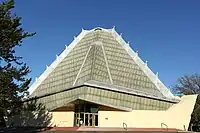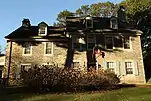Westminster Theological Seminary
Westminster Theological Seminary is a Presbyterian and Reformed Christian seminary in Glenside, Pennsylvania. According to Roger E. Olson, it has had an influence on evangelicalism far beyond its size.[2] Beyond Westminster's impact in the theological realm, the pioneering work of Albert Groves and his students has produced the codification of the Westminster Leningrad Codex, which underlies all modern Bible Software.[3]
 | |
| Motto | ΠΑΣΑ Η ΒΟΥΛΗ ΤΟΥ ΘΕΟΥ (Greek) |
|---|---|
Motto in English | The whole counsel of God[1] |
| Type | Private |
| Established | 1929 |
| President | Peter Lillback |
| Students | 692 (2017) |
| Location | , , United States |
| Campus | Suburban |
| Website | www.wts.edu |
History

Westminster Theological Seminary was formed in 1929, largely under the leadership and funding of J. Gresham Machen.[4] Though independent, it has long had a close relationship with the Orthodox Presbyterian Church, which Machen helped found in 1936. The Seminary was founded by members of the faculty of Princeton Theological Seminary, following a controversy over the perceived liberal direction that Princeton was beginning to take.[5] Westminster Theological Seminary considers itself to be the faithful continuation of Princeton's historic theological tradition. Many of the founders of Westminster, including J. Gresham Machen, John Murray, Oswald Allis, Robert Dick Wilson, and Cornelius Van Til, had been professors at Princeton prior to the controversy.[5] The first president of the Seminary was Edmund Clowney, who served from 1966 until 1984. He was followed by George C. Fuller and Samuel T. Logan. In 1982, the California branch of Westminster became an independent institution, Westminster Seminary California, and in 2009 the Dallas branch was established as Redeemer Theological Seminary (Reformed Theological Seminary's Dallas campus since 2017). The current president is Peter Lillback, who also serves as a professor of Historical Theology.[6]
Westminster was accredited in 1986 by the Association of Theological Schools in the United States and Canada[7] and received accreditation in 1954 by the Middle States Association of Colleges and Schools.[8]
Theological position
In Philadelphia on September 25, 1929, J. Gresham Machen declared the following in his inaugural address:
"We believe, first, that the Christian religion, as set forth in the Confession of Faith of the Presbyterian Church, is true; we believe, second, that the Christian religion welcomes and is capable of scholarly defense; and we believe, third, that the Christian religion should be proclaimed without fear or favor, and in clear opposition to whatever opposes it, whether from within or without the church, as the only way of salvation for lost mankind. On that platform, brethren, we stand. Pray that we may be enabled by God’s grace to stand firm. Pray that the students who go forth from Westminster Theological Seminary may know Christ as their own Savior and may proclaim to others the gospel of his love."[9]
The current board and faculty continue to hold to this original vision. All trustees and faculty members are required to affirm their agreement with the theological perspective presented in the Westminster Confession of Faith and the Larger and Shorter Catechisms, the core doctrinal statements of many Presbyterian denominations.[10]
Academics
The seminary currently offers the following degrees: Master of Divinity (M.Div.), Master of Arts (MA), Master of Theology (Th.M.), Doctor of Philosophy (Ph.D.), and Doctor of Ministry (D.Min.).[7][11]
Westminster publishes the semi-annual Westminster Theological Journal.[12][13]
Leadership
- Edmund Clowney (1966–1984)
- George C. Fuller (1984–1991)
- Samuel T. Logan (1991–2005)
- Peter Lillback (2005–present)
Notable alumni
- Greg Bahnsen
- Susan Wise Bauer
- Joel Beeke
- Alistair Begg
- Ralph Blair
- Robert M. Bowman, Jr.
- Anthony Bradley
- Eugene S. Callender
- Edward John Carnell
- Stafford Carson
- Jack Cottrell
- Glenn Davies
- Mariano Di Gangi
- John Frame
- John Gerstner
- Bruce L. Gordon
- Thomas David Gordon
- Wayne Grudem
- Vern Poythress
- Chulha Han
- Allan Harman
- Edward F. Hills
- James B. Jordan
- Gordon Keddie
- Timothy Keller
- John Euiwhan Kim
- William L. Lane
- Peter Leithart
- Tremper Longman
- George Marsden
- Taylor Marshall
- Carl McIntire
- Bruce Miller
- Robert Morey
- Harold Ockenga
- Manuel Ortiz
- Yun Sun Park
- Richard L. Pratt, Jr.
- H. Evan Runner
- Philip Ryken
- Francis Schaeffer
- James Skillen
- Robert Sungenis
- Kevin Vanhoozer
- Marten Woudstra
See also
- List of Westminster Theological Seminary people
- North China Theological Seminary (the "Westminster Seminary of China")
References
- "The Westminster Seal". Westminster Theological Seminary. 2009. Retrieved December 26, 2010.
- Olson, Roger E. (2007). Pocket History of Evangelical Theology. InterVarsity Press. p. 70. ISBN 9780830827060. Retrieved 25 February 2015.
- DeRose, Stephen (2018-05-15). "Top 10 Evangelical Seminaries in the U.S." Successful Student. Retrieved 2019-10-24.
- Marsden, George M. (1995). Reforming Fundamentalism: Fuller Seminary and the New Evangelicalism. Wm. B. Eerdmans Publishing. p. 33. ISBN 9780802808707.
- "History". Westminster Theological Seminary. Retrieved 2019-10-22.
- "Faculty Profile: Peter Lillback". Westminster Theological Seminary. Retrieved August 21, 2011.
- "Member Schools: Westminster Theological Seminary". Association of Theological Schools in the United States and Canada. Retrieved July 20, 2010.
- "Institution Directory: Westminster Theological Seminary". Middle States Association of Colleges and Schools. Retrieved July 22, 2010.
- from appendix A, “Westminster Theological Seminary: Its Plan and Purpose,” which previously appeared in J. Gresham Machen, What is Christianity? And Other Addresses, ed. Ned Bernard Stonehouse (Grand Rapids: Eerdmans, 1951
- "Board Affirmations and Denials" (PDF). Westminster Theological Seminary. 3 December 2008. Retrieved August 21, 2011.
- "Degree Programs". Westminster Theological Seminary. Retrieved July 22, 2010.
- "The Westminster Theological Journal". Westminster Theological Seminary. Retrieved August 21, 2011.
- The Westminster Theological Journal. WorldCat. OCLC 1715830.
| Wikimedia Commons has media related to Westminster Theological Seminary. |



